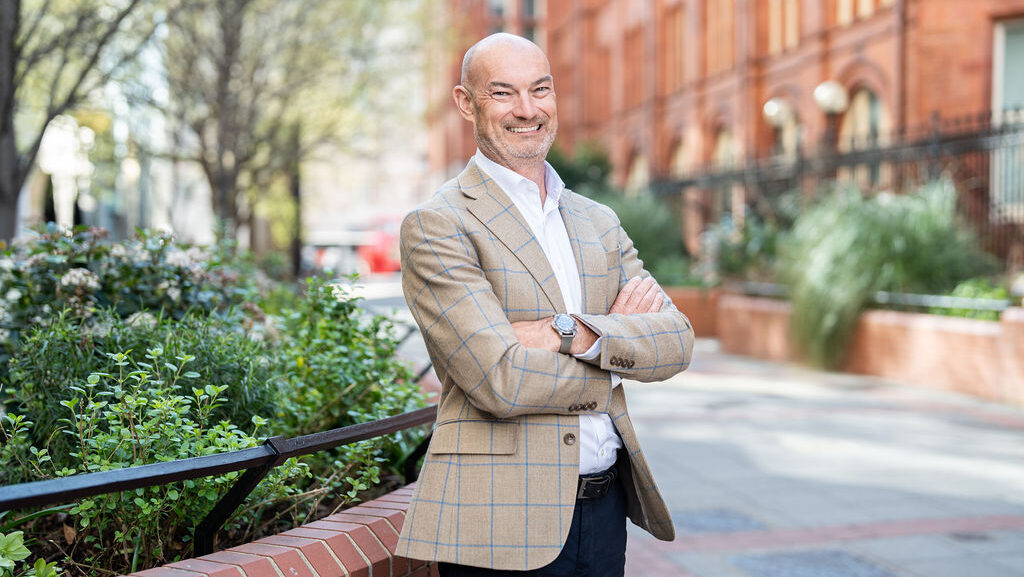Anthony Newman, senior specialist relationship manager at Allica Bank, examines the finance challenges for the nursery sector
Bright spark
Philip Smith, UK managing director at Bright Horizons, tells Charlotte Goddard about his role and responsibilities at the UK’s second-largest nursery group

It’s a sunny day, but the atrium of Bright Horizons Parsons Green in West London is hung with a rainbow of umbrellas. The bright colours stand out against the cool white walls and ceiling, with the odd green plant adding a soothing touch. The setting has just been refurbished, with pastel colours and natural materials purposefully chosen to create a calm atmosphere.
Bright Horizons’ UK managing director Philip Smith spends a good deal of his time visiting nurseries. In the 10 months since he took the helm, he has visited around 125, a good proportion of the organisation’s 300-plus settings. While he has an interest in every room of the nursery, there’s one particular area he makes a beeline for due to the 16 years he spent working for catering facilities management business, Sodexo. For the last three years Smith headed up its education arm, which provides school meals and other services to independent and state schools, and universities.
“When I visit a nursery I make a point of going into the kitchen,” he says. “We provide 30 million meals a year to our children, and for those who are here first thing in the morning to last thing at night, five days a week, the only meals they get are from Bright Horizons, so they need to be high quality and nutritious.”
While many nurseries serve food in the same rooms children spend the rest of their time in, Bright Horizons Parsons Green has a separate ‘café’ for preschoolers, laying the foundations for the school experience where they are likely to eat in a hall or canteen. Across the group the chef is seen as an integral part of the nursery, and at Parsons Green a child-height window allows children to peep into the kitchen to see him or her at work as they pass by.
“In some nurseries we have little children’s kitchens which are the cutest things,” says Smith. “Food is a learning and social experience. I can still remember being at primary school and cooking; it’s a life skill.”
Smith says he was attracted to Bright Horizons by the chance to make a difference in people’s lives. This is not only through the nurseries, but also the Bright Spaces which the Bright Horizons Foundation for Children has set up within domestic abuse refuges, police child protection suites, hospitals, hospices and prison visiting areas.
There are now more than 100 Bright Spaces, safe, relaxing and welcoming spaces for children and families, with comfortable furniture, soft furnishings, toys, games, books, art supplies and relaxation resources. “It is an incredible thing, through our volunteering and charitable work we raise funds to create these Bright Spaces,” he says. “The opportunity to do that sort of thing is what drew me to Bright Horizons.”

As managing director of the UK’s second-largest nursery group, Smith believes he has a responsibility to act as a voice for the sector, particularly when it comes to influencing government policy. “We are in the privileged position of having an opportunity to influence government and work with government,” he says. “I think we have a duty to be a voice in the industry given the size and scale of Bright Horizons in the marketplace. We have got a seat at the table with the Department for Education (DfE) and the early education minister Stephen Morgan. Even during the short time I have been at Bright Horizons I have met Stephen Morgan twice and been in dialogue with him. I think he has real empathy with the sector.”
Smith believes the government’s heart is in the right place when it comes to earlyyears. “We have a government which is choosing to invest in early years, which is excellent.” However, he feels there should be more of a focus on targeting expansion funding, such as the School-based Nurseries Capital Grant, away from areas which are already well-served. “We are really supportive of putting funding in, but making it really targeted to those areas where you want to make a difference.”
When it comes to the government’s recently published guidance on funded places, including the need to make any additional charges voluntary, Smith says Bright Horizons is complying. “We have had next to no pushback from our parents, who have been very supportive of what we can charge for,” he explains. “Our role as a big provider is to continue to work on a dialogue with government. The intention is good, but the way it is deployed through 150-plus local authorities has some variation, and we would like government to think about how they continue to talk to local authorities about making it consistent.”
Like other big groups, Bright Horizons engages with the DfE through The National Partnership in Early Learning and Childcare which represents ten large nursery providers. “It is effectively a trade body and enables us to try to understand what the government wants to achieve and help it on the journey of how to invest in the right areas.”
Smith also believes that, as a large provider, Bright Horizons has a responsibility to contribute to understanding about child development through research. “We have a team of early childhood specialists who do an awful lot of work in this area,” he says. “This year we established an education advisory board which includes our own senior people and academics from Nottingham Trent University and other institutes. They are advising us on the latest findings around child development and early education, thinking about what we need and thinking about what the market is going to do in the future. That feeds into our curriculum, and our staff training.”

As a leader within Bright Horizons, Smith sees his role and that of his senior team as being “to create the environment where others thrive. We need to create the infrastructure where the nursery manager and the team in the setting provide exceptional care to the families who rely on their support. My role is to make sure they have the right resources to provide a quality nursery environment for children to thrive in.”
While consistency across Bright Horizons settings is important, managers are also given the opportunity to put their own stamp on the nursery. The manager of Parsons Green has taken advantage of the online catalogue from which managers can choose pre-vetted resources up to a certain budget, investing in child-size sofas and child-safe ovens, for example.
Bright Horizons is consistently recognised in the Great Place to Work Awards, appearing on the UK’s best workplaces list for the 20th consecutive year in 2025. This year the company was also recognised in the Best Workplaces for Development and Best Workplaces for Wellbeing categories. “We have a very strong employee value proposition which was put in place around two years ago,” Smith says. “Our pay and benefits are towards the top end of the market, and we try to externally benchmark that as much as we can.”
It’s not all about pay, though. “When you get a pay rise it is a short-term incentive but quickly becomes normalised,” he says. “We have a very strong professional development programme for all of our teams. We also focus a lot on staff wellbeing becausewe are seeing a workforce that has been challenged post-Covid, and we have to be mindful of that and create environments where the workforce can grow and thrive.”
Eight network groups, coordinated by diversity, equity, inclusion and belonging lead Mark Hamilton Anderson, aim to provide targeted support across the business. The employee-led groups, which come together to share ideas and support each other, include LGBTQ+ in Early Years, Men in Early Years and a team focusing on menopause support. “They report every quarter into my board to share their learning and their next steps,” says Smith. Bright Horizons actively recruits men into its nurseries, and is feeding into a government campaign around men in early years.
The walls of the refurbished Parsons Green nursery have been painted with inspiring quotes – not so much for the children, but as a constant reminder to the adults working there about the value of their job. “The role of the adult is to provide unconditional ‘professional love’ fostering emotional resilience” says one. “Children are capable, curious, active learners,” reads another, while a third says: “we believe in children’s rights, and put their safety and wellbeing first”.
Going forward, Smith would like to use his position to advocate for the professionalism of the sector. “You often hear nursery work is a vocation, but that underplays what nursery workers do – it is a profession. We need to continue to advocate for them as professionals, through their career development, their pay scales, their visibility and standing.”
In September, Bright Horizons is launching a staff academy on the top floor of one if its Cambridge nurseries. “Cambridge is one of the areas where there is a strong demand for childcare but we struggle with recruitment, because it is a highly educated population, and people have gone into science or academia,” he explains. “We have established our own training academy to grow our own talent in areas where we can’t naturally recruit the way we would like to, working with local schools and colleges.”
For Smith, shaping futures is what his role is all about – not only the futures of the children in the settings, but also the professional futures of Bright Horizons’ staff.
Latest Features
Jordan Tully, managing director of Toots Day Nursery Group and founder of the ‘Exploring Early Years With Jordan Tully’ podcast…
Georgina Bryant, corporate and commercial partner at solicitors firm Barcan and Kirby, sets out some of the problems associated with…




